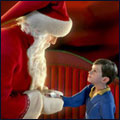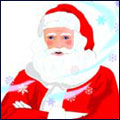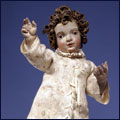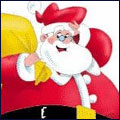December:各国圣诞风俗大比拼
(单词翻译:单击)
|
圣诞节虽然是西方的一个重要节日。但是随着西方文化的传播,越来越多的中国人开始接受并且喜欢上这个节日。圣诞节如此受人们欢迎是为什么呢?你想不想知道各个国家的人们是如果看待圣诞节以及渡过的吗?希望了解更多,就往下看吧!!! |
 |
 |
 |
 |
||||||||||||
| The polar express |
Father Christmas |
Christkind |
Santa Claus |
Christmas was brought into China several years ago and only celebrated1 by a few people to begin with but it is now almost universally accepted.
In China, Christmas has been well received because the people already enjoyed giving gifts to each other.
Santa Claus has been easily accepted by Chinese people - a kindly2 man who carries a huge pack with red hat and black boots.
 In England
In England
Christmas is celebrated on December 25th.
Children write letters to Santa detailing their requests for Christmas gifts.
Gifts are traditionally opened on Christmas afternoon.
Stockings are hung up and filled with small gifts, fruit and nuts.
Christmas carols were first sung.
People like to kiss under the mistletoe.
Boxing Day is a unique holiday for this country. Boxing Day was traditionally a day for giving to the less fortunate.
Christmas dinner is usually a Roast Turkey with Christmas pudding and mince3 pies for dessert.
Christmas decorations must be taken down on the Twelfth Day after Christmas otherwise it brings bad luck for the rest of the year.
Santa is known as Father Christmas.
 In Australia
In Australia
It never snows at Christmas.
Christmas is in the summer holiday.
Christmas is always early.
A traditional Christmas dinner is often held in the backyard for BBQ's, picnics in the garden or even on the beach.
A typical Christmas menu could include cold meats, pasta, salads and fruit.
Santa is also known as the Swag Man.
The first official Christmas was on December 25th 1788.
We do not follow the American ritual of having real Christmas trees.
There is a harmonious4 mix of ethnic5 groups, so there are many culturally diverse Christmas celebrations.
People call the Christmas season the "silly season". #p#副标题#e#
Christmas is a deeply religious festival.
The Christmas season officially begins on December 8th.
Christmas Eve is known as the "Good Night". It is a time for family members to gather together to rejoice and feast around the Nativity scenes that are present in nearly every home.
A traditional Christmas treat is turron, a kind of almond candy.
December 28 is the feast of the Holy Innocents. Young boys of a town or village light bonfires and one of them acts as the mayor who orders townspeople to perform civic6 chores such as sweeping7 the streets.
Refusal to comply results in fines which are used to pay for the celebration.
Children receive gifts on January 6th - the feast of the Epiphany.
Children leave their shoes on the windowsills and fill them with straw, carrots, and barley8 for the horses of the Wise Men.
Their children's favorite Wise Man is Balthazar who rides a donkey and is the one believed to leave the gifts.
People say "Feliz Navidad" for Merry Christmas.
Santa Claus is called Papa Noel and some children will also receive presents from him on December 24th. In Russia
In Russia
St. Nicholas is extremely popular.
St.Nicholas is also known as Grandfather Frost.
New Year Day is the main holiday.
Father Frost delivers presents on New Years Eve.
Traditionally a figure called Babushka gave gifts to the children. Babushka is an old woman or grandmother with a headscarf tied under the chin.
Christmas is celebrated on January 7th.
Christmas day begins at midnight with churches ringing in the day with magnificent choral chanting.
Christmas Eve dinner does not contain any meat.
People eat a special porridge called "Kutya." This is made of wheat berries or other grains, which symbolize9 hope and immortality10, and honey and poppy seeds, which ensure happiness, success, and untroubled rest.
A ceremony involving the blessing11 of the home is frequently observed. A priest visits the home accompanied by boys carrying vessels12 of holy water, and a little water is sprinkled in each room.#p#副标题#e#
In Germany
They hold special markets every December that specialize in selling decorations and other Christmas related paraphernalia13.
The people make and drink a spiced wine, which is called "mulled wine" in English and "Gluhwein" in their own language.
One of the famous traditional Christmas toys is the Nutcracker doll that now comes in many different styles.
The "Advent14 Calendar" originated here and is now used by children in many other countries that celebrate Christmas.
The Advent Calendar is used for counting down the days to Christmas and has twenty-four little doors with a picture and sometimes chocolate behind each one.
Children leave out a sock on December 6th for Saint Nicholas to fill with candies.
Families gather together on Christmas Eve to open their presents.
A traditional cake is eaten at Christmas time, called "Stollen" cake. It is very rich, fruity and coated with marzipan and icing sugar.
The Christmas tree originated.
At Christmas time if you been a bad boy or girl you will be visited by the evil Hans Muff and receive nothing.
 In France
In France
Every home displays a nativity scene featuring little clay figurines made in the south of this country.
The Christmas tree has never been popular here.
In many areas children receive gifts from Pere Noel.
They receive gifts on both December 6th and Christmas Day.
In other regions the gifts are delivered by "Le petit Jesus".
There is a traditional grand feast every year held after midnight mass on Christmas Eve.
A world famous cake is baked for the Christmas season in the shape of a log, usually coated in chocolate and extremely delicious.
One part of the country celebrates Christmas by eating turkey and chestnuts15.
The capital city celebrates by eating oysters16.
Adults wait until New Years Day to exchange gifts.
 收听单词发音
收听单词发音
1
celebrated

|
|
| adj.有名的,声誉卓著的 | |
参考例句: |
|
|
|
2
kindly

|
|
| adj.和蔼的,温和的,爽快的;adv.温和地,亲切地 | |
参考例句: |
|
|
|
3
mince

|
|
| n.切碎物;v.切碎,矫揉做作地说 | |
参考例句: |
|
|
|
4
harmonious

|
|
| adj.和睦的,调和的,和谐的,协调的 | |
参考例句: |
|
|
|
5
ethnic

|
|
| adj.人种的,种族的,异教徒的 | |
参考例句: |
|
|
|
6
civic

|
|
| adj.城市的,都市的,市民的,公民的 | |
参考例句: |
|
|
|
7
sweeping

|
|
| adj.范围广大的,一扫无遗的 | |
参考例句: |
|
|
|
8
barley

|
|
| n.大麦,大麦粒 | |
参考例句: |
|
|
|
9
symbolize

|
|
| vt.作为...的象征,用符号代表 | |
参考例句: |
|
|
|
10
immortality

|
|
| n.不死,不朽 | |
参考例句: |
|
|
|
11
blessing

|
|
| n.祈神赐福;祷告;祝福,祝愿 | |
参考例句: |
|
|
|
12
vessels

|
|
| n.血管( vessel的名词复数 );船;容器;(具有特殊品质或接受特殊品质的)人 | |
参考例句: |
|
|
|
13
paraphernalia

|
|
| n.装备;随身用品 | |
参考例句: |
|
|
|
14
advent

|
|
| n.(重要事件等的)到来,来临 | |
参考例句: |
|
|
|
15
chestnuts

|
|
| n.栗子( chestnut的名词复数 );栗色;栗树;栗色马 | |
参考例句: |
|
|
|
16
oysters

|
|
| 牡蛎( oyster的名词复数 ) | |
参考例句: |
|
|
|




